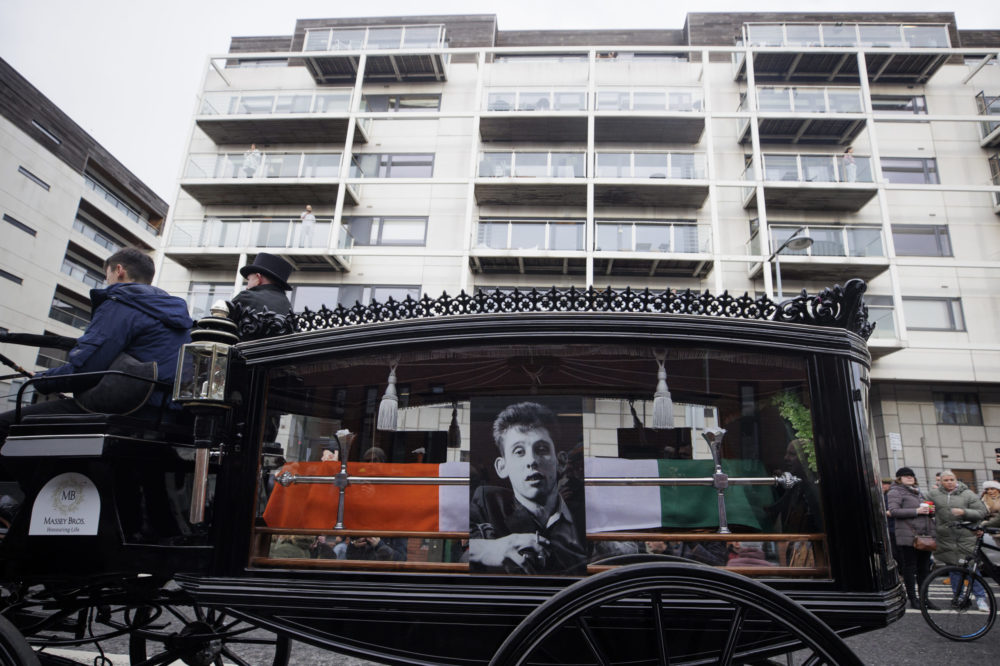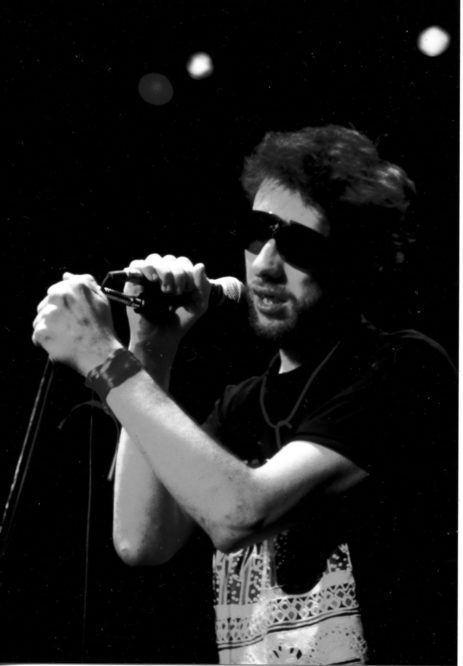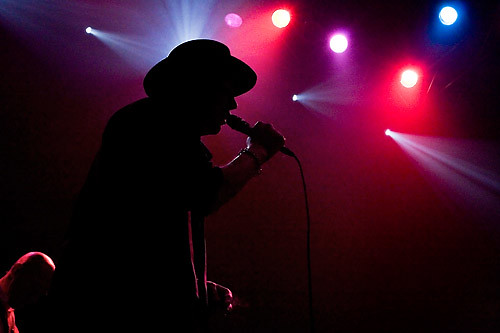A Rake At The Gates Of Hell

Ben Wildsmith
35 years ago next week I sold my scientific calculator. I’d given up maths, or it had given up on me, after my GCSEs, but a more logically minded school friend, David, wanted one for his A levels. He offered me a tenner or a spare ticket he had to see a band at Birmingham NEC.
‘You’ll love them, trust me.’
So, after school on Monday 12th December 1988, I find myself at New Street Station boarding a train to that godforsaken warehouse of a venue out by the airport. The platform is swarming with police who are checking everybody’s bags and confiscating alcohol.
‘It’s going to be lively,’ David smiles.
On the train, everybody has band T-shirts on, the older the T-shirt, the higher the status of wearer. A menacing looking passenger in a flat cap sports a shirt from 1984 and he’s king of the carriage. He’s anticipated copper-interference and equipped himself with a silver hip flask. Surrounded by younger girls in Doc Marten boots, he produces a tin whistle and starts to play. Everybody seems to know the words.
I am going, I am going any which way the wind may be blowing…
A commuter in his 50s, wearing a pinstripe suit and carrying a briefcase and black umbrella, opens the carriage door, putting a single, polished shoe on the step to board. The whistle player whirls round to face him.
‘Are you a Pogues fan?’ he demands.
‘Er, am I a what?’ the businessman asks nervously.
‘This is a Pogues train! Get off my fucking train! Get off my fucking train!’ the lunatic screams.
I am going, I am going, where streams of whiskey are flowing.
Cultural minefield
Outside the venue, touts are offering fortunes for our tickets. Knock-off T-shirts are on sale, and there’s a stall with a petition for the release of the Birmingham Six. The sterile, concrete environs can’t neuter the frantic excitement of people who know, for certain, that they are in the right place at the right time.
Because the late 1980s were a cultural minefield. Everybody’s mum and dad had seen the Beatles or the Stones, older brothers had been punks so how come we’d been left with Rick Astley?
Before Kylie ascended to become a Cilla Black-style national treasure, the sheer everywhereness of Stock, Aitken & Waterman’s production line pop couldn’t be enjoyed ironically. It blared from shops, clubs, and radios as you went about your day, announcing that bland, cheerful consumerism was to be your lot in the new Britain.
The tail-end of New Wave resistance to such showbiz schlock had petered out into jangly guitar bands like the Soup Dragons, or musical politics lecturers like New Model Army. It just wasn’t enough. The hollowness of a suburban adolescence demanded more, and this is where more could be found.
The stage is set like a living room at Christmas. There’s a huge, tinsel-strewn standard lamp, a Christmas tree, the drum riser is a sofa, and at the side of the stage is a twelve-foot fridge with ‘Pogueator’ written across it.
The music on the PA increases in volume and intensity as road crew place instruments on the stage and showtime approaches: Thin Lizzy’s ‘Whiskey In The Jar’, ‘Rise’ by Public Image Limited, ‘Straight to Hell’ from The Clash. Finally, the house lights dim, and the crowd starts chanting,
There’s only one Shane MacGowan…

Danger
We’ve jostled to the front and it’s the most danger I’ve felt in my life so far. The shove from behind pushes us all so close that we’re trapped and can’t move our arms in the overpowering heat, sweat and cider fumes.
My chest is crushed against someone’s arm so I can feel my heart beating against it. My feet are on the floor but taking no weight as pressure from either side lifts me up like a Subbuteo figure.
Suddenly, the mass gives way and about a hundred of us fall like dominoes; Christ, is this it? I’m dragged upright by my hair and the Pogueator door opens. Bright, white light and dry ice stream out as if to announce our release from hell.
Eight figures emerge from the fridge in silhouette, indistinguishable in the light until the last raises his fist…
There’s only one Shane MacGowan…
Steadying himself at the microphone stand, Shane surveys the writhing mass in front of him.
‘You look like you need a priest,’ he observes.
And we do, because behind the desire for a raucous night out, the passion of this crowd betrays more powerful emotions. Around us, society is being ripped apart and remade in the service of profit as an end in itself.
As the unions are broken by Margaret Thatcher’s government, the communities they represent are losing not just their industrial purpose but their means of expression. Traditions and local meeting places are being hurled on the pyre of financial services as embarrassing anachronisms of a bygone age.
Everything must be new, privately owned and profitable. You should be ashamed to ride a bus, or sing in a choir, or live in social housing. Burn it all down; get out there and hustle for your BMW.
Defiant
The band jolts into the introduction to The Broad Majestic Shannon and whistle, accordion, cittern, acoustic guitar, banjo, bass, and drums sync into an urgent caress. It quickens the heart and calms the nerves simultaneously as centuries of tradition step into 1988 to scorn the tepid mush on the radio. It pounds as it lilts: defiant and nurturing, ancient and young. Shane closes his eyes.
The last time I saw you was down at the Greeks
There was whiskey on Sunday and tears on our cheeks
You sang me a song that was pure as the breeze
On a road leading up Glenaveigh…
I sat for a while at the cross at Finnoe
Where young lovers would meet when the flowers were in bloom
Heard the men coming home from the fair at Shinrone
Their hearts in Tipperary wherever they go
Take my hand and dry your tears, babe
Take my hand, forget your fears, babe
There’s no pain, there’s no more sorrow
They’re all gone, gone in the years, babe
Longing
For Shane, Ireland was more than a home, as a London Irishman it was a state of mind, a psychological space where being human could be epic, and time didn’t march to the drum of our masters.
His audience was full of people who were exiled in some way. The sons and daughters of immigrants, kids from broken homes, those who’d seen too much, too soon.
There was a sentimental streak through these songs that spoke to a hurt part of us: a soft spot that was prone to addiction or mental illness and vulnerable to the new, harsh reality outside. Everyone in there was longing to be reconnected with something; to inhabit a space where our scruffy, teary boisterousness was smiled upon by adults who cared.
Shane wrote of care leavers selling themselves on the streets of London; he could look through the eyes of an ancient street drinker to see the wars behind them and the tunes he’d whistled.
In the tube station the old ones who were on the way out
Would dribble and vomit and grovel and shout
And the coppers would come along and push them about
And I wish they could escape from the old main drag
Sing, yarn, and dream
He’d seen the inside of mental institutions himself and tried to sleep amidst the screams of people who’d been left there for good. But he loved life, and people, and music, so he wanted that for us. We weren’t ever going to Club Tropicana, none of us, but we could gather together in city pubs to sing, yarn, and dream our way through youth.
Dear dirty, delightful, drunken old days.
Shane’s passing reminds us of how much we’ve lost since those days. The Pogues couldn’t exist at all now. The band was born in a world where cheap bedsits or squats meant that you could spend a few years becoming good at something. The dole acted as an artist support programme that produced a whole generation of actors, writers, musicians, and painters.
Was that really too much to ask after 6000 years of civilisation? Is it so unthinkable that young people be offered a bit of time to explore life, or receive an education before being harnessed to a wheel and told to pay up? Apparently, it is.
At the time I was working for a landlord, and he was the meanest bastard that you have ever seen,
To lose a single penny would grieve him awful sore, and he was a miserable bollocks and a bitch’s bastard’s whore.

The references in Shane’s songs could set you on a lifetime of discovery. Brendan Behan, The Dubliners, Lorca, James Joyce, Rimbaud, Johnny Cash, W.B. Yeats, they contained a treasure box of the good stuff if you were minded to listen. A few years later, our diminished culture was offering the dumb insolence and ham-fisted Beatles pastiche of Oasis as its cutting edge.
Our actors, painters, writers, musicians, and even chefs are mainly posh boys now. Nobody else is afforded the time to refine themselves beyond conforming to whichever business model will pay the rent. Those who can’t are starved or medicated until they can. Our music is presented in antiseptic, corporate venues and sucked up into the ether by Spotify to be whored out for scant reward to the musicians who made it.
The passing of Shane MacGowan came as no surprise, it’s true. Nothing is surprising any more.
Now the song is nearly over
We may never find out what it means
Still there’s a light I hold before me
You’re the measure of my dreams
The measure of my dreams
Support our Nation today
For the price of a cup of coffee a month you can help us create an independent, not-for-profit, national news service for the people of Wales, by the people of Wales.







Diolch for this. Rest In Peace Shane.